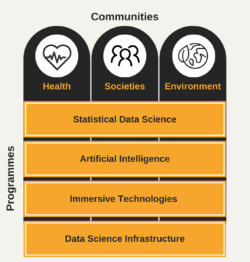Annual Showcase 2022
Introduction
Research & Innovation

This has been another exceptional year for consolidating the LIDA R&I Strategy. During the past year, we undertook several community workshops to consolidate the formation and strategic goals of the three LIDA Communities and have launched several new methodological LIDA Programmes.
LIDA Community and Programmes, alongside several LIDA Interest Groups, are vertebrate and provide structure to our community of over 300 scientists across the University of Leeds. In addition, LIDA continues to build synergies and collaborations nationally and internationally and plays a major role in the Alan Turing Institute.
Over the past year LIDA has supported a research portfolio of 71 projects, worth £95m. We’ve contributed to the award of 14 research grants totalling almost £30million and a further ten grant applications (value of £5m) awaiting results. All research grant applications that LIDA supported in this time ranged across our expertise in Health, Societies and Environment for a multitude of different funders, with wealth of different partners across the public, private and third sectors.
Some high-profile grants we have supported this year include Leeds Biomedical Research Centre (BRC), the Vulnerability and Policing Futures Research Centre and Food Insecurity in people living with obesity (FIO Food), to name just a few.
Communities
LIDA’s research communities are currently focused on three main challenge areas that require interdisciplinary working and have spent the past year getting established.
Health
Societies
Environment
Programmes
Supporting our communities are four cross-cutting programmes of work that focus on exploiting and developing our capabilities and capacity within four key methodological data analytics areas.
Statistical Data Science
Artificial Intelligence
Immersive Technologies
Data Science Infrastructures
Our Research & Innovation Ecosystem
Consumer Data Research Centre (CDRC)
Centre for Immersive Technologies
NIHR Biomedical Research Centre
Centre for Computational Imaging & Simulation Technologies in Biomedicine
Centre for Environmental Modelling And Computation (CEMAC)
Leeds Omics
Centre for HealthTech Innovation (CHI)
Strategic Partnerships
We believe in innovation through collaboration and work closely with a wide range of data partners in the public, private and third sectors to ensure the Institute’s academic expertise is channelled towards addressing real-world challenges.
LIDA is currently working with a number of key partners. Please click the partners below to read more about these collaborations.
